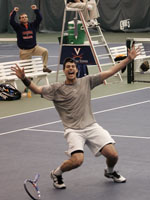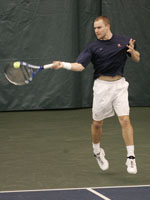 |
|
Drew Courtney clinched the match and the team title by winning his match. (Photo courtesy Ian Rogol) |
With Virginia on the verge of winning its third consecutive National Team Indoors Championship, coach Brian Boland couldn’t help but let a grin creep on to his face, which only grew broader as he scanned the a sea of orange and blue on hand at the Boar’s Head Sport’s Club.
Drew Courtney led 5-3 in the third set and was on serve at 40-love. He had three match points to play with – not only for his match, but for the 2010 National Team Indoors Championship, as the Cavaliers already led Tennessee 3-1. Courtney put a finger in front of his face, shrieking, “One more!” causing the surprisingly large Monday afternoon crowd to erupt.
For the smiling Boland, it’s not that he assumed the match was already won as Courtney toed the baseline on match point. Rather, he said, he was “embracing the moment.”
And what a moment it was. As the return of a big first serve from Courtney sailed high beyond the baseline, Boland raised two fists in the air, and a dog-pile on top of Courtney ensued. With a 4-1 victory over Tennessee, the Cavaliers became the first team since the mid-1970s to win three straight National Team Indoors Championships. They were hosting the tournament for the first time in school history to boot.
“I’m thrilled for the young men in our program. They deserve all the credit,” Boland said. “The way we practiced when we bounced back from [last week’s loss to] Kentucky – it’s a resilient group, it’s a group that understands how important it is to stay composed and be poised, and step up and play their game freely when they need to, and I’m proud of them.”
Though the Hoos had cruised to a berth in the final in their first three matches, the 4-1 victory over Tennessee did not do justice to how tight the match truly was. In particular, the outlook was not brilliant for the Cavaliers at the outset; the Volunteers dominated the doubles point, as the Hoos’ top two doubles tandems fell by scores of 8-1 and 8-2.
The last time Virginia was outclassed in doubles came just nine days earlier, when Kentucky won all three doubles matches by three games or more. That outing ultimately decided the match with the Wildcats, as the 4-3 loss broke a regular-season winning streak of 63 matches for Virginia.
As the Cavaliers went to the locker room after losing the doubles point to Tennessee, Boland was once again frustrated with his team’s performance in doubles. While he would not reveal exactly what he told his team in the locker room prior to singles, he did paraphrase his speech for reporters – “the PG version,” he said.
“The paraphrasing was, that I was extremely disappointed in what happened out there, and the tougher team’s going to win today,” Boland said he told his team. “If you guys can look each other in the eye right now, and decide who’s tough on this team, who has the resilience and toughness, [that team] is going to win.”
“This match is even right now,” Boland continued. “These guys came out, they have all the momentum. How tough are you? You can go out there and find a way to not get it done or you can go out there and find a way to leave everything you have on the court, and fight, and scrap, and work yourself through it, and whatever’s left.”
In particular, Boland made a bold prediction in singles. Throughout the tournament, he coached the players on the No. 4 through No. 6 singles courts, leaving his assistants to man the top three courts. And, throughout the tournament, the Cavaliers had yet to lose a match in the No. 4 through No. 6 singles slots. Against Tennessee, he forecasted a similar result.
“I told the guys, ‘Look, I’m coaching down below [with the No. 4 through No. 6 singles players], we’re coming away with three points,” he said. “We would like three up [at the No. 1 through No. 3 slots], but you better bring home one. So I told those guys at the bottom, ‘Hey, the pressure’s on you.'”
None of Virginia’s four singles victories came easily, but Boland’s prediction was right on the money. Three of the four singles matches were won at the No. 4 through No. 6 positions, and Michael Shabaz won his match at the No. 1 slot to give the Hoos the deciding point.
“When you look at today’s match and how dominated we were in doubles – after feeling good about ourselves [previously] – and then to be able to bounce back, says a lot about the character we have on this team,” Boland said. “They heard a few things in the locker room, but regardless of what I say, they have to go do it, and they did it.”
 |
|
Lee Singer hits a return shot during the match with Tennessee. (Photo courtesy Ian Rogol) |
Fittingly, the singles triumphs began with seniors Houston Barrick and Lee Singer – to whom Boland had said, “You’re the seniors, this is when you step up. You find a way, I don’t want any excuses.” At the No. 5 slot, Barrick easily won his first set; then at 4-4 in the second, he smacked two cross-court forehand winners to break serve before serving out the next game to a 6-2, 6-4 victory over Matteo Fago. Singer then won an equally pivotal game in the second set, breaking Davey Sandgren at 5-5 before serving to a 6-2, 7-5 victory to give Virginia a 2-1 lead.
The crucial match, however, was played between the two titans of the afternoon at No. 1 singles. No. 3-ranked Michael Shabaz matched up with No. 2-ranked John-Patrick Smith, who held a streak of 13 consecutive dual-match victories dating back to last season. In addition to ultimately playing perhaps the most important match of the afternoon, the two players also had a personal score to settle – they had played each other twice previously in their college careers, and each had 1-1 records to show for it.
“I knew going into the match it was going to be a battle, and it was going to come down to a few points, and who would basically play points better at the bigger moments,” Shabaz said.
Shabaz drew blood first, as Smith double-faulted into the only break of the first set, which decided Shabaz’ 6-4 opening-set win.
In the second set, the two players played the game of the day with Smith on serve at three games all. The score went to deuce, and returned there time and again as the two players alternated points – Shabaz earned numerous break points with some bruising ground strokes, but Smith refused to back down, coming up with big serves and clutch passing shots when he needed them most. In the midst of the heated battle, there was even a bit of gamesmanship – after a ball went behind the tarp on Smith’s end, he disappeared behind the tarp and retrieved an apparently brand new ball, as it had a different number from the balls they had been playing. Staring in the face of a game point for Smith, Shabaz called out his opponent for the ball switch, and the judge halted the game and ordered Smith to change balls.
Perhaps the stoppage shook Smith, or perhaps it was inconsequential – either way, Smith finally erred on a break point, sending a forehand volley beyond the baseline. That proved to be the deciding game for Shabaz, as he maintained that momentum to a 6-4, 6-4 victory.
“Those kinds of games change matches,” Shabaz said. “I knew if I could get the break, I had the match kind of in the bag. But, at the same time, if he holds there, it’s a new set again. That was definitely a mental game, and that was a huge game that shifted the match.”
With Virginia up with a commanding 3-1 advantage, the question then became, which Cavalier would finish the job? With Courtney entering his third set at No. 4 singles and Jarmere Jenkins having already dropped his first set at No 3, the answer initially appeared to be Sanam Singh at No. 2; Singh had taken the first set 6-4 and broke twice in a row to start the second set at 3-0. Tennessee’s Boris Conkic, however, responded by breaking Singh’s serve twice to even the score at 3-3, and ultimately took the second set with another break at 6-5.
“I lost a little bit of focus,” Singh said. “I was serving 6-4, 3-0, 30-0, and I should have closed it out in the next 15 minutes.”
As both Singh’s and Jenkins’ matches entered a third set and stood very much in doubt, the importance of Courtney’s match became apparent. Even with Courtney leading the third set 5-3, his serve had not been indestructible, as Sandgren had broken Courtney once already en route to a 6-3 second-set triumph.
But, with most of his teammates, his head coach, and a vocal crowd behind him, the look in Courtney’s eye spoke volumes. Unaware of how Singh’s and Jenkins’ matches were going, Courtney knew only that if he served out his match, Virginia would make history.
“I just wanted to hit four good serves,” Courtney said. “I felt that if I could put four big serves on the court, try and make [Sandgren] beat me that way, then if he came up with some good shots, that’s too good.”
“The bottom of the dog-pile hurt a little bit,” Courtney said with a chuckle. “But it was a lot of fun.”
With that, Virginia became the first team to win three consecutive National Team Indoors Championships since Stanford, which won the first three tournaments in 1973, ’75, and ’76, with no tournament played in ’74. In the process, the Cavaliers rewarded their loyal followers; Boland addressed the home crowd at the conclusion of the championship match, calling them “the best fans in college tennis.”
“We appreciate every one of you that walked into the building this last week, we’ve had some unbelievable crowds,” Boland told the fans. “Thank you so much fans, you’re the best in the world.”



